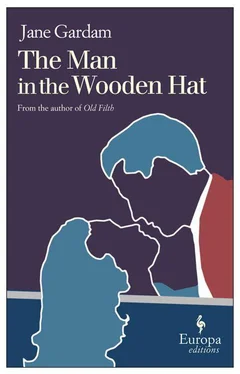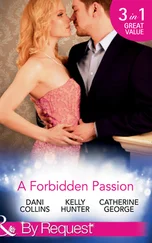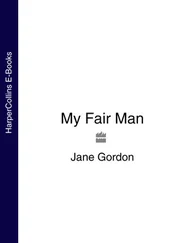“Very well,” said Filth and, later, politely, “Very good.”
“I wasn’t sure about leaving the feet in.”
Filth’s splendid face began slowly to crack into a smile. Regarding her, he began to laugh, a rare and rusty sound.
“Well, I was born in Tiensin,” she said.
“Do you know what you are, Elisabeth Feathers?”
“No?”
“You’re happy. I am making you happy.”
“Yes. I am. You are. Come on. Eat up your feet.”
She thought about it as she cleared up the unconscionable amount of washing-up engendered by the coq-au-vin, as Edward sat in the Picasso chair, his papers for the next day fanning out all around him on the white carpet. Getting down to them on his knees for a moment, he got up covered in white fluff, but said nothing.
“You are happy,” said Delilah next morning over the garden wall as Betty hung out washing. “What are those queer little tabs? Is it a variety of sanitary towel?”
“No, it’s Edward’s bands,” she said. “Barristers’ bands to tie round his neck in Court. They have to be starched every day. He used to have them sent out, which is fine in Hong Kong, but here — he says they are four pence each.”
“Aren’t you going to get a job? Did you ever have one?”
“Yes. Foreign Service once.”
“Oh. Clever, are you?”
“Yes. I am. Very. But I’m having a rest. I can’t help it, Delilah, being clever. Oh, God!” The washing line came down in the flower bed.
“But when the baby comes?”
Betty, scrabbling and disentangling Edward’s under-garments, froze.
“Well? I’m right, am I not? I can always tell. To an actress it is vital.”
Betty sat back on her heels, stared up at the flamboyant trees behind Delilah’s head. Said nothing.
“Do I speak out of turn? Most humble apologies.”
“No, no, Delilah. Not at all.”
At length Betty said, “Yes.”
“There’s a doctor down the road. He’s set up his brass plate except that it is not brass but a piece of cardboard in the window. It is one of these new Indian doctors who are coming over. I believe they’re very good, if you don’t mind them touching you.”
Betty got up and went into the house and stood in thought. She stared at the white carpet.
“That will have to go,” she said.
She looked at the long windows open to the floor and the road below, and wondered if the balcony outside was strong. She smiled and addressed the black candles from the Scottish Play and said, “I thought I couldn’t be happier and I find that I am,” and alone she set off to the doctor.
And that day she walked and dreamed, smiling lovingly at every passer-by, crossing roads when lights were red, touching heads of children. At Buckingham Palace she stood gazing through the railings like a tourist. She crossed to the steps of the monument to Queen Victoria and looked up at the ugly, cross little face. Scores of children! she thought. And madly in love.
In St. James’s Park she leaned on the railing of the bridge and watched the ducks circling busily about and every duck became a celestial duck and the bridge was made of silver, and diamonds were scattered about on the muddy path. The willows swung and sighed over the water. She walked up Birdcage Walk and across Horse Guards Parade, shabby and colourless with wartime sandbags still here and there in sagging heaps. She walked past the door of Number 10 Downing Street that needed a coat of paint, and to the river that rolled deep and fast beside her and would do so long after she was dead. And the baby too.
She walked past the end of Northumberland Avenue, past Cleopatra’s Needle, the flaking dying Savoy Hotel with its medieval-palace cellars. She walked up to the Strand, crossed over into Aldwych, up to the Temple and to Edward.
“Yes?” said the clerk, sharpish. “What name please? Mr. Feathers is in conference.”
“I’m Elisabeth Feathers. Betty Feathers. I’ve come to thank you for the chair.”
A clutch of girls behind massive typewriters all looked up at the same moment and a junior clerk, like Mr. Polly in a stiff collar, dusted a chair and brought it for her.
“We can’t disturb him,” said the clerk. “I’m so sorry. But he won’t be long. Congratulations on joining our Chambers!”
“Well, I’m not a barrister,” she said. “Maybe I will be one day. I feel I could do anything. Oh, and we’re giving a party.” As she spoke and they all sat observing her she knew that she looked beautiful. Happiness makes you beautiful. I am happy and beautiful as an angel. .
The door into the clerks’ room opened and Edward came in and stopped, astounded.
Beside him, reaching not much above Edward’s waist, stood Albert Ross.
“It’s all right,” one of the typists was saying. “Mrs. Feathers? It’s all right. You just fainted for a moment. Here. Water. All right? Sit up carefully.”
“Jet lag,” Edward was saying. “We’ve been home for weeks but we almost covered the globe on our honeymoon. Elisabeth, you’ve been working too hard at the bloody house.”
“Where is he?”
“Who?”
“Ross, Albert Ross. I thought I saw him standing beside you.”
“You did. He’s gone. Don’t worry, we’ll both be seeing more of him soon. There’s a big new Case in Hong Kong. Betty, sit quite still until they get us a taxi. I’ll come back with you.”
“No. Don’t fuss. I’m fine. I just couldn’t stop walking. I walked all the way from home.”
“But it’s miles! It must be four or five miles!”
“It was lovely. I just thought I’d call in.”
When Mr. and Mrs. Feathers had gone, Charles, the head clerk, went to the pub and the junior clerk for his sandwiches. The typists brought out their packed lunches and thermos flasks and cigarettes. One girl lay back in her chair. “Pregnant,” she said. “Well! Good old Filth.”
After the miscarriage of her child at four months, Elisabeth was to be in Hong Kong again with Edward and it was universally agreed that it would be excellent for her health. “Look at the colour of you,” said Delilah. “Milk-white, pinched and drawn, and staring eyes. Go back to your old friends and sit in the sun.”
“I like my new friends,” she said. “I’ve never had friends I like better. I can stand on the doorstep in my dressing gown and watch the world go by. In Hong Kong they open the hotel door for me and I wear gloves and a hat to keep my English skin milk-white. Like my grandmother.”
“But you’re not recovering. Not like us at your age. Gave thanks when it happened. Better than back streets and penny royal.”
“Don’t. Please.”
“I’m sorry, Elisabeth. Dexter and I had none and we never felt the loss. We had each other. And work.”
Elisabeth drifted in her narrow garden. She didn’t go out into the beautiful Regency crescents and squares behind Mozart Electrics towards Knightsbridge and Hyde Park, where the war-torn houses were being returned to their natural composure. Old cottages built for nineteenth-century artisans and mews houses and stables for grooms and horses round Chester Square were going freehold for a song. “We should buy one, I suppose,” said Edward. “It might be useful.” But she refused to go to look.
The streets around Victoria were full of prams. Once she took a bus to Hyde Park (“for the air,” said Delilah) and there were wild rabbits in the bushes. The Peter Pan statue was being repaired in Kensington Gardens. Unchanged, the nannies in navy-blue uniform and pudding-basin hats were striding out behind baby carriages, each bearing a spotless baby. The war seemed to have made no difference. Some perambulators had crests painted on their flanks. When Elisabeth sat down on one particular park bench, two nannies approached her and one of them said, “Excuse me, but this seat is only for titled families.” She walked the side streets after that but there was nothing that brought her comfort.
Читать дальше












